IT outsourcing to Romania is gaining traction – this software industry’s revenue is expected to reach over $507 million this year, while the CAGR will be 10.02% in 2025-2029. This is happening for several reasons: the third-largest tech talent pool in Eastern Europe, the 48.7% lower cost of labor vs the US, the highest English proficiency in EE, and many others.
I’m Dmytro Ovcharenko, СEO of Alcor, a software R&D center services partner. If you’re a US tech product company looking to recruit senior Romanian software developers and compliantly hire them without an entity, let us set up such a team for you from 10 to 100 in a year. Silicon Valley-caliber talent in Eastern Europe or Latin America. 40% cost effectiveness vs Romania’s outsourcing. Full support: from payroll to business visas. No buyouts.
In just 15 minutes, you’ll learn the key pros and cons of outsourcing in Romania, debunk its tech industry myths, and see how this outsourcing location stands out in Eastern Europe. Bonus: I’ll share if IT outsourcing to Romania works for IT product companies and give a more complex approach for them. You’ll know whether Romanian outsourcing is bad or good for your business.
Key Takeaways
- Romania’s IT outsourcing engine is revving up – software-services revenue is on track for $507 million in 2025 with a 10% CAGR through 2029, powered by EE’s #3 talent pool and wages nearly 50% lower than the US.
- Senior developers earn approximately $81,000 in Romania vs $157,000 in the USA, yet rank first in Europe for certified IT pros and English skills, delivering a sweet spot between savings and expertise.
- Romania produces 7,000 new ICT grads each year, ten local universities are QS-ranked, and over 16,000 software firms feed a booming startup scene featuring UiPath and eMAG.
- Bucharest, Cluj, Iași, Timișoara, and Craiova offer R&D parks, tax breaks (10-year profit-tax holiday for innovation), and 2–4 hour flights to major EU capitals.
- Better than classic outsourcing: Alcor builds your Romanian R&D team of 10-100 senior engineers in under a year – 40 % cheaper than vendor rates, full EOR compliance, transparent invoices, IP retained, and zero buyout fees.
7 Key Advantages of IT Outsourcing to Romania
1. Growing IT industry in Romania
The primary key benefit of Romania is that its IT services market is large – this year, it has reached $1.36 billion in revenue. The growth will happen steadily – at a 4.88% CAGR for the next 5 years. Software development outsourcing remains the biggest segment, expected to grow twice as fast as the overall IT market in Romania. At the same time, product development represents only 10%-15% of the overall ICT industry’s activity. What’s in it for US tech product companies? An opportunity to tap into the Romanian IT industry while it’s still not overheated in this segment, and successfully hire developers who are tired of working for outsourcers.
2. Attractive price-to-quality ratio
Outsourcing in Romania has a balanced price-to-quality ratio. The average salary of an American senior Blockchain developer is $156,600 a year. In Romania, it comes to $81,000, which is almost twice as affordable. Similarly, a senior mobile development team that consists of a Product Manager, a UI/UX Designer, a Mobile Developer (iOS/Android/Xamarin), a Python Developer, and an Automation QA Java Engineer, with benefits & average recruitment fees included, would cost $927,200 in the US per year vs $483,190 in Romania.
Thus, if you run a US-based tech product company, outsourcing software development to Romania could lead to a 48.7% cost reduction, considering the average annual employment costs for middle, senior, and lead developers.
3. Outstanding techexpertise
According to the ITA, Romania comes 1st in Europe and 6th globally for the number of certified IT specialists per 1,000 inhabitants – more than in the USA. If you hire developers in Romania, you’ll get well-versed coders with programming expertise in popular languages like Java, JavaScript, C#, Python, React, Angular, HTML, and CSS.
These deep qualifications are provided by tech education universities offering computer science programs, such as the Politehnica University of Bucharest, the Technical University of Cluj-Napoca, the Politehnica University of Timișoara, the Gheorghe Asachi Technical University of Iași, and others. Ten Romanian universities are featured in the QS World University Rankings 2026. What’s more, 59 domain-specific educational institutions annually bring up almost 7,000 new ICT professionals.
4. Blossoming startup & business ecosystem
Romania is home to 16,017 software development businesses. This number has grown by 8.6% from 2020 to 2025 and shows no signs of slowing down. Most of these firms operate in business services, healthcare, financial services, and e-commerce. They deliver custom outsourcing software development services, IT strategic consulting, web development, technical support, information security, and mobile app software development.
As for the startup scene, Romania boasts around 2,500 startup companies, scale-ups, VCs, and PEs, as well as about 100 incubators & accelerators and €19B in enterprise value. Everything needed for a vibrant ecosystem for entrepreneurs. The top-performing sectors are IoT, fintech, marketing, and gaming, while local unicorns include UiPath and eMAG. No wonder Romania’s startup ecosystem ranks 9th in EE.
5. Ripe IT hubs attracting global tech giants
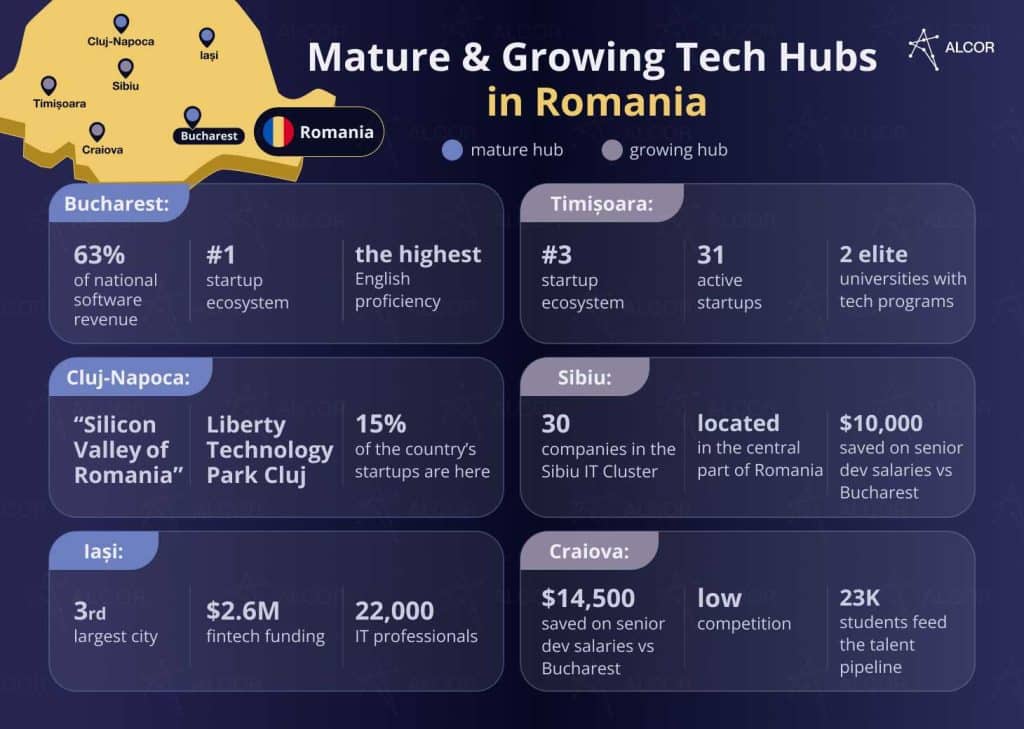
Bucharest
Holding 63% of software development revenues, Bucharest is a shining star in Romania’s tech market. This dynamic city has the #1 startup ecosystem in Romania and the 8th across Eastern Europe, amassing about 58% of the country’s startups. Together with Cluj-Napoca and Timişoara, it hosts 175,000 tech specialists. What’s even better, Bucharest has the highest English proficiency in the country, according to the EF EPI.
Its robust technological infrastructure, flourishing business landscape, and strategic location explain why Google, Microsoft, Amazon, Oracle, Dell, and Adobe outsourced software development to Bucharest.
Cluj-Napoca
Cluj-Napoca is another thriving tech hub in Romania, often referred to as the “Silicon Valley of Eastern Europe” and, of course, the “Silicon Valley of Romania”. With a developed IT infrastructure and startup ecosystem, Cluj-Napoca hosts15% of the country’s startupsand has the second-best ecosystem in Romania. Cluj-Napoca is home to the R&D offices of global tech giants, such as Microsoft, Accenture, Siemens, Endava, and Emerson.
The city also hosts a technology park – Liberty Technology Park Cluj, which accelerates the growth of local tech companies and hosts multiple meet-ups and networking events. Among the residents are Siemens, CDS, Nordstar Logistik, etc.
Iași
Romania’s third-largest software development city, Iași, has undergone an impressive technological transformation. From a post-industrial center, it’s now a booming tech hub with modern offices, tech parks, and infrastructure. Even though it’s not as huge as Bucharest, Iași has a talent pool of 22,000 IT professionals and has exceeded $2.59M in total startup funding. All these benefits have attracted leading product and software development companies like Amazon, Oracle, Accenture, and Microsoft to the local market.
Timișoara
Having the third-greatest startup ecosystem in Romania, Timișoara hosts 31 startups in 2025. The city is home to the 7th best university in the country – the West University of Timișoara, as well as to the Politehnica University of Timișoara, which is a well-known computer science institution in the city. Together, they graduate thousands of skilled software developers to enrich theIT in Romania. Product and software development companies like Amazon, Wipro, and Cognizant have already established their offices there, while Nokia, Bosch, and Procter & Gamble are hiring local software development pros.
Sibiu
Sibiu is a growing tech hub in Romania located in the central part of the country, with a diverse IT&C community as part of the Sibiu IT Cluster, hosting over 30 tech companies. While this hub doesn’t have many tech graduates annually (500, according to unofficial sources), this city offers cost savings of around $10,000 in terms of senior developer salaries – $54,500 gross per year vs $64,500 in Bucharest, according to levels.fyi.
Craiova
Craiova is an emerging tech hub and an industrial cluster in Romania that is attracting new product and software development companies from the US and Western Europe: Ford, Hengst Filtration, and others. The city hosts one of the top Romanian universities for tech education in the QS World University Rankings 2025, the University of Craiova, which enrolls over 23,000 students who then become a part of a new educated software development workforce in the Romanian market, including the tech sector.
While still developing, Craiova is the perfect go-to destination for companies looking to set up the software team in a place with minimal competition and lower salaries – $50,000 gross per year in Craiova for a senior developer on average vs $64,500 in Bucharest, according to levels.fyi.
6. Business-friendly climate
What else makes Romania one of the most favorable outsourcing locations for custom software development is its secure business environment. The Romanian government offers tax incentives for product and software development companies exclusively engaged in innovation and R&D. They include:
- Profit tax exemption for the first 10 years for companies involved in innovation and R&D;
- 50% deduction of the eligible R&D expenses;
- Accelerated depreciation for R&D equipment.
7. Convenient location in Eastern Europe
Another advantage of opting for software outsourcing to Romania is its strategic location. It borders Ukraine, Hungary, and Bulgaria, which allows global tech companies to tap into the potential of neighboring markets easily. It takes only 2-4 hours by plane to get to the largest tech centers in Europe. If you nearshore to Romania, you benefit from great alignment between the local software development team and crews in other CEE countries or Western Europe.
Debunking Myths about Outsourcing to Romania
1. Stumbling IT sector
Rumor has it that the Romanian IT industry is growing too slowly. But look at the facts:
- Romanian ICT service exports reached $11 billion in 2024 and are expected to hit $51.7 billion by 2028.
- The Romanian outsourcing industry accounts for $3.5 billion of revenue.
- 13% of VC investment in CEE is attributed to Romania.
- Statista reports that IT technology in Romania has a highly skilled workforce and competitive pricing in 2025, resulting in high demand.
From my perspective, the recent growth numbers of IT in Romania undermine any bias and highlight that the right time for US IT companies to enter this market is now.
2. Few tech specialists to set up a development team
Supposedly, the technology market in Romania lacks sufficient talent. In reality, it abounds with 250,000 IT specialists – the #3 tech powerhouse in the EE in 2025.
Are all Romanian software developers concentrated in tech hubs? Bucharest, Cluj-Napoca, and Iași act as the leading tech hubs, and Timișoara, Sibiu, and Craiova are the emerging ones. Yes, I must admit that the point of hub-dependent distribution of software engineers in Romania is valid.
Considering the local tech talent market and labor law, building a team of remote Romanian software developers might be challenging. For example, Ledger, a French hardware wallet company, lacked local IT sector knowledge when establishing a nearshore development hub in Eastern Europe. Alcor guided them in tax management, labor law, IP rights protection, and employment contracts, helping ensure 100% compliance with both legislations.
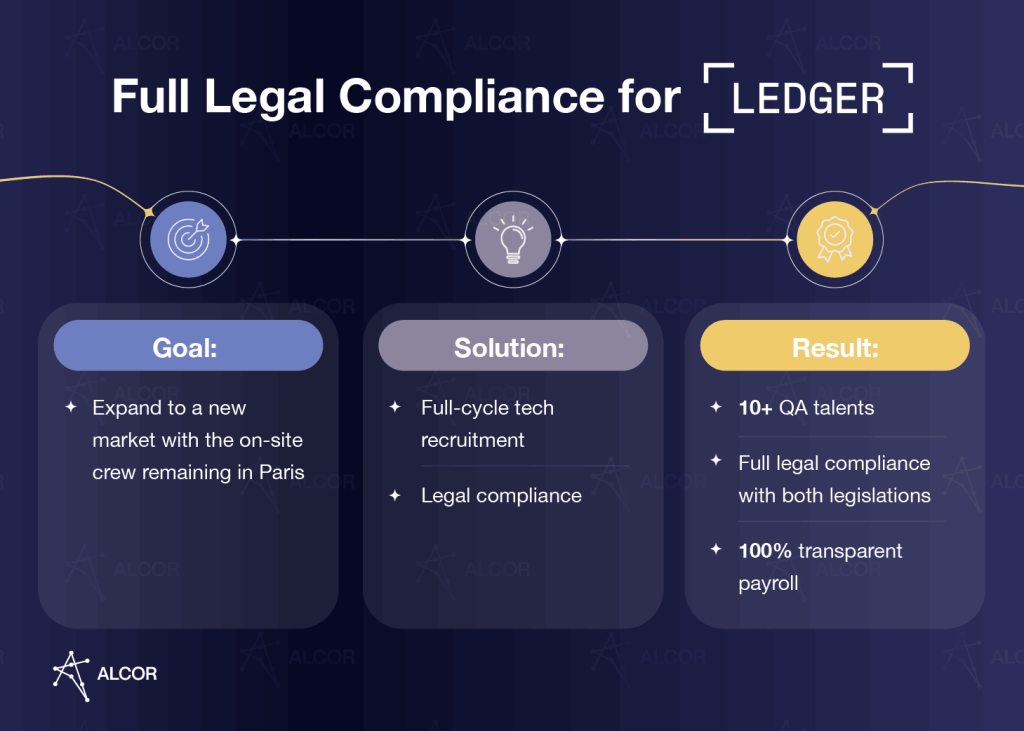
3. Poor English knowledge
What else can make Romania’s software outsourcing seem risky is its presumably low level of the English language. Stats disprove it once again: this destination is ranked 12th globally and 10th in Europe in the 2025 EF English Proficiency Index. My international clients say they’ve never had any problems with feedback provision or task-setting in Romanian software teams.
Moreover, English is not the only language Romanian developers know. It’s common for these IT professionals to have a good command of German, French, or Italian. Easy and effective communication with foreign IT companies serves as another reason for choosing software development in Romania.
4. Significant cultural gap
The final myth about Romania’s outsourcing is cultural dissimilarity. In fact, all Eastern European countries have a close affinity with Western culture and business ethics, and Romania is no exception. Suppose you decide to scale up your tech business by setting up your software development team in Romania. In that case, each member will demonstrate exceptional cultural adaptability, open-mindedness, dedication, and a desire to take your product to the next level.
Romania vs Other Eastern European IT Outsourcing Destinations
As you now know the advantages and disadvantages of outsourcing in Romania, it’s time to assess its performance in the Eastern European arena. Let’s do a location comparison.
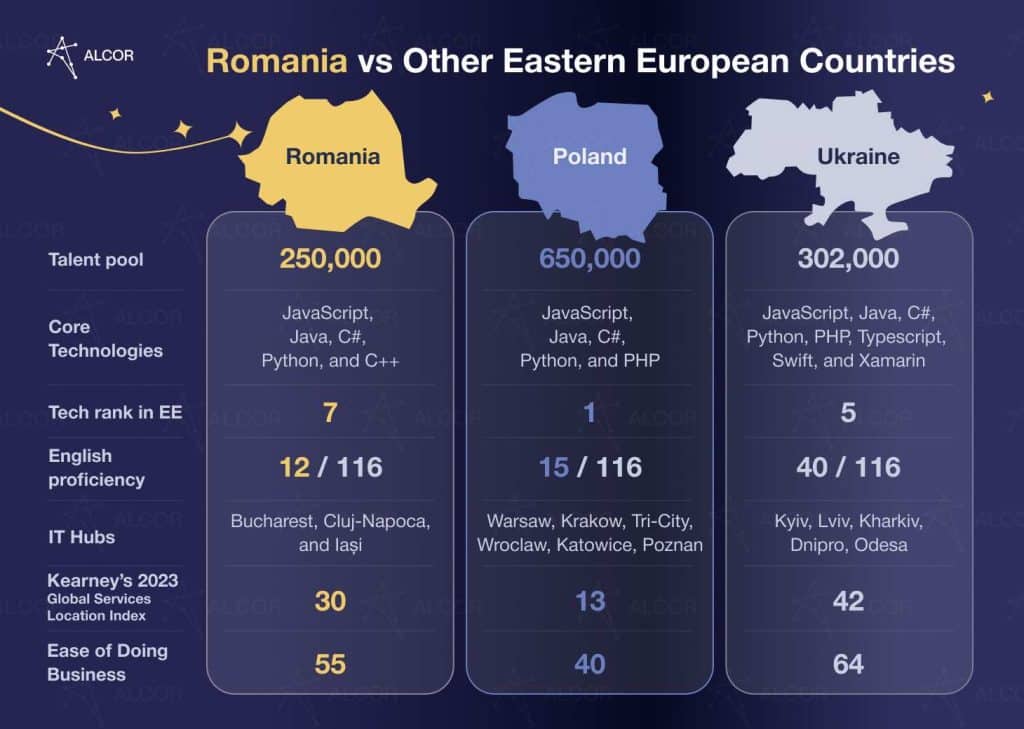
From the data above, we can see that Poland has the largest talent pool in Eastern Europe – 650,000 tech gems. For its part, Romania secures the 3rd position following Ukraine. The key tech industry expertise is roughly the same, but in Romania, developers are more well-versed in back-end. The country’s tech rank is the lowest, but the English level is the highest among the three.
By the way, Romania is now ranked 6th by the Coursera Global Skills Report 2025. The business climate of Romania is A3, which means that the country’s legal system and institutions provide a favorable environment for foreign investment in the local IT sector.
| Senior Positions | Romania | Poland | Ukraine |
|---|---|---|---|
| Data Science Engineer | $57,000 | $82,800 | $51,600 |
| Embedded Developer | $74,400 | $70,800 | $67,200 |
| AI Engineer | $78,000 | $81,000 | $69,000 |
| Python Developer | $81,000 | $81,600 | $72,000 |
| DevOps Engineer | $81,600 | $87,000 | $72,000 |
| Mobile Developer(iOS/Android/Xamarin) | $81,600 | $78,000 | $72,000 |
| Blockchain Developer | $81,000 | $84,000 | $60,000 |
| Node.js Developer | $81,600 | $78,000 | $72,000 |
| Cloud Engineer | $84,000 | $81,000 | $69,600 |
| Developer salaries were converted to US dollars at the relevant exchange rate for August2025. | |||
With the annual senior developer costs compared, the price tag for Romanian developers is lower than the Polish software developer’s salary and higher than the Ukrainian software developer’s salary. To illustrate, consider the median salary of DevOps Engineers, Blockchain, AI, Node.js, and Mobile App Development Experts. In Poland, it varies from $78,000 to $87,000 a year, while in Romania, it ranges between $78,000 and $81,600 a year, surpassing Ukraine’s range of $60,000-$72,000.
In conclusion, Romanian software development has limitless potential because of affordable compensation and top-notch expertise in the tech domain. Therefore, opting for Romanian outsourcing is a winning option for your tech business.
What Can be Better than Outsourcing to Romania
Using IT outsourcing services in Romania is not your only way to develop a tech product.
We at Alcor can launch your software R&D team backed by our EOR services in Romania. This solution is more advanced than any deal with a Romanian software development outsourcer because:
- You get a senior technology team in Romania, hired from scratch with clear pricing. No more paying senior-level salaries for mid-level expertise.
- You get 40% cost efficiency vs Romania’s outsourcing because of transparent invoices and no markups.
- You manage the team and retain the IP rights instead of sharing them with third parties.
- Your programmers are fully integrated and loyal to your product, unlike the outsourced developers who see you as just another client.
- You get free insourcing at any time instead of buying out programmers later.
Our team works like a clock so that you can establish an R&D hub of 10-100 in Romania within a year with full HR, legal, and operational support.
Real Challenges When Outsourcing Software Development to Romania
1. Employment contracts & taxes
For foreign IT companies, the Romanian government offers two main approaches to hiring Romanian developers: an employment agreement (Contract de Muncă) and a B2B contract (Contract Civil). But both come with peculiarities.
An employment agreement follows the Romanian Labor Code, obliging employers to withhold payroll taxes and social security contributions. They impose strict rules on work conditions and termination, yet guarantee employees a fixed salary, benefits, set hours, PTO, and clear exit terms. The salary is paid in local currency to prevent inflation from eroding its value.
- Employer’s share: Social Security Contributions (SSCs) consisting of a labour insurance contribution of 2.25% and a pension insurance contribution of 0%-8%. There are several reasons for this range, which are better communicated with local legal representation from a reliable partner like Alcor.
- Employee’s share: A 10% personal income tax (PIT) of the employee’s gross income and around 35% in SSCs (a pension insurance contribution and a health insurance contribution).
A B2B contract falls under the Civil and Fiscal Codes. A developer must register as a sole trader and handle their taxes and social contributions, which means that the client has no tax burden. The compensation is paid in foreign currency, protecting it from inflation and FX swings. Benefits, PTO, and working terms are negotiated individually and tend to be stricter than standard employment contracts. A developer must cover:
- A PIT, the percentage of which depends on the type of registration, whether SRL (Societate cu Răspundere Limitată), which can be 1%-16%, or PFA (Personă Fizică Autorizată) – 10% of the gross income.
- Social Security contributions:
- Pension insurance contribution (for income over 24 minimum salaries): 25%.
- Health insurance contribution: 10% of the net income.
2. Time zone differences
Romania has a strategic location in Europe because it shares only a 1-2-hour time difference with neighboring countries. But the scenario is different when it comes to the US – the average time difference between Bucharest and New York is 7 hours, while with San Jose, CA, it reaches 10 hours. This can sometimes lead to irregular and abrupt cooperation between the in-house team in the US and offshore developers in Romania.
However, with a well-organized workflow, proper management tools, and regular meetings, time zone differences are not a threat to productive cooperation and digital transformation, even throughoutsourcing IT to Romania. The next question is – which of Romania’s outsourcing services to choose?
Tips to Make Outsourcing to Romania Easier
Identify tasks for delegation
Before you decide to outsource to Romania, it’s important to know which tasks or projects you want an IT outsourcing provider to handle. If your business isn’t in the tech industry and you have one-time tasks, you can easily pass them to an outsourcing provider in Romania. They’ll take care of everything from start to finish, liberating you from the hassles associated with tech recruitment and project management.
If you run a tech product company and need help with product development, traditional outsourcing in Romania might be risky due to poor development quality, no access to the team, and threats to IP rights. In this case, think about using recruitment process outsourcing (RPO) to get your team of skilled developers.
Choose a cooperation model
The next step is to learn about engagement models to work with local developers. There are 4 of them:
- Fixed price: You set the project’s requirements, budget, and timelines in advance. This reduces the chances of unexpected costs, but it’s not flexible, which can hinder project progress.
- Time & material: You pay for the actual hours spent on the project. Beware: without clear planning and timeframes, you might spend a lot more than expected.
- Dedicated team: This flexible model allows changes throughout the project. However, you won’t get your team of developers with this model, which could impact product quality. Plus, sometimes buying out such a team from a provider can cost millions of dollars.
- Offshore development center: This is the best model for global companies in tech. You can build a loyal team of developers in a cost-effective location that belongs to you from the start. It’s safer than traditional outsourcing, but your provider is key. Consider partnering with a reliable company to set up an offshore development center.
When choosing an IT outsourcing provider in Romania, make sure they possess local market expertise, a strong track record, outlined guarantees, and positive reviews on independent resources. It’s vital to remember that a good vendor should be interested in your business success, providing the most efficient methods to streamline your outsourcing journey.
IT Services to Outsource in Romania
If you have already decided to outsource to Romania, consider the three following services:
1. Business process outsourcing (BPO)
Outsourcing business-related processes is a widely used practice among tech companies that embark on offshoring. It allows them to hand over secondary activities to a local third-party vendor while focusing on product development.
You can choose from a wide variety of back-office services, including tech recruitment, HR management, employer branding, legal compliance, or outsourced payroll in Romania. It’s not rare to also see front-office operations (marketing, software development, customer support, etc.) among the BPO services. However, if you are the owner of a product company, it’s better to refrain from delegation since it’s the core of your business.
2. Software development outsourcing
With more than 300 IT outsourcing providers in Romania, foreign companies have a range of services at their fingertips. While tech outsourcing to Romania is a popular strategy, it’s important to recognize its potential risks and drawbacks. When partnering with a provider delivering IT outsourcing to Romania, product tech companies may encounter issues like cloudy pricing, potential data leaks, reduced control over software development and delivery, and even failed attempts to secure additional investor funding. Therefore, to keep your essential activities in-house, consider setting up your engineering team in Romania.
3. Tech recruitment outsourcing
This option comes in handy for tech companies seeking the advantages of offshoring or nearshoring software development in Romania. Cooperation with a competent tech recruitment company will enable you to get only seasoned engineers, set competitive annual remuneration and an attractive EVP, receive full coverage of the hiring processes, and get in-depth consultations on the local tech market.
A US-based tech product company, Dotmatics, chose this path when expanding into Eastern Europe. Cooperating with Alcor, Dotmatics not only reduced costs by 40% compared to outsourcing to Romania but also assembled a top-tier team of 30+ software engineers within a year! Notably, several critical positions, including Product Manager and QA Engineer, were promptly filled with qualified candidates. Not to mention other services delivered: payroll, accounting, compliance, benefits, and procurement management. In July of 2025, Dotmatics was acquired by Siemens, while its developers benefited from stock option payouts in full.
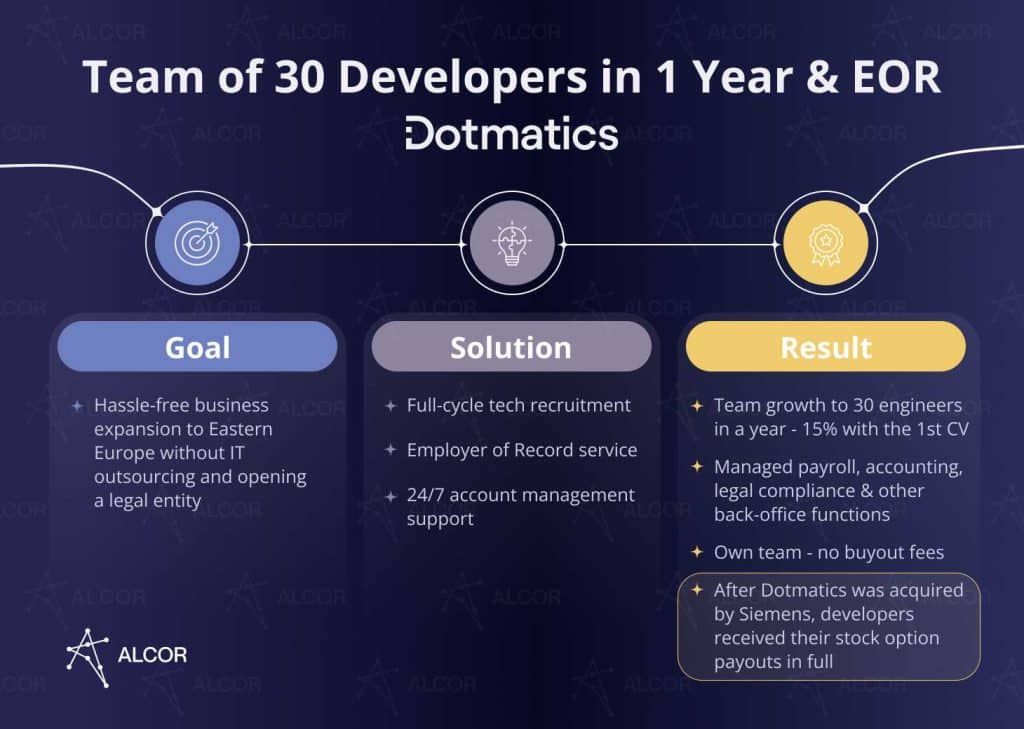
But in addition to these options, there’s also the most complete solution for tech.
Expand to Romania with Ease
To experience all the benefits of Romania as an outsourcing destination, consider cooperation with a partner that understands and delivers for the tech industry. We at Alcor launch software R&D teams and provide IT recruitment services in Romania, Poland, Ukraine, Bulgaria, and IT sourcing hubs of LATAM. We focus only on the IT industry, and it shows in all services – from tech recruitment to benefits management.
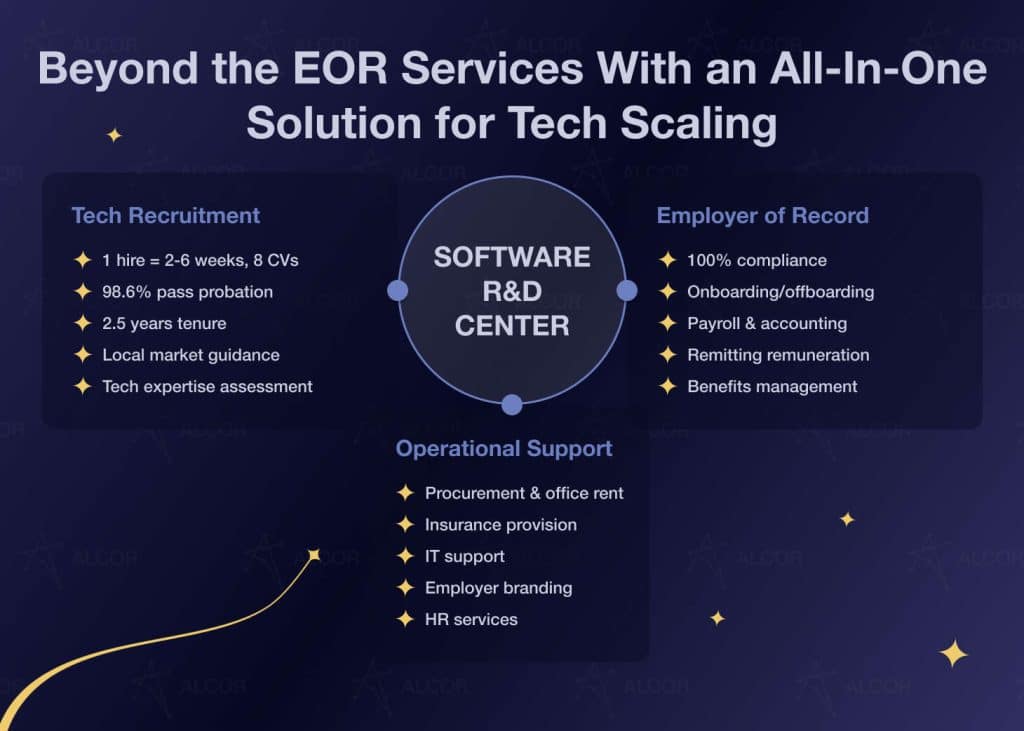
With our support, GoTransverse, Chartbeat, Sift, Ledger, and other clients worldwide have successfully expanded to Eastern Europe, having approved 80% of our candidates, successfully onboarded 98.6%, and then received full Employer of Record and operational support from us.
Here’s how they got all of it:
- EOR services in Romania. With Alcor, you don’t need to register a local legal entity or a bank account. We already have both and will hire developers on your behalf. Plus, you get payroll, compliance, taxes, benefits, and onboarding/offboarding support.
But we don’t make any decisions – it’s up to you. - Tech recruitment. You receive CVs of the top 10% of local devs from our 253,000+ network of pre-vetted candidates and other sources. The time-to-hire at Alcor is 2-6 weeks, and then these developers stay with you for 2.5 years on average. Plus, you have an option to insource them for free at any time.
- Operational support. Our team handles IT infrastructure management: office lease, equipment procurement, business visas, and other high-quality services for your Romanian software development team: always in touch, ready to solve arising queries.
FAQ
1. What are the advantages of outsourcing in Romania?
There are multiple reasons for choosing Romania as an outsourcing destination: balanced price-to-quality ratio, huge talent pool, high English proficiency, business-friendly climate, and convenient location. Read this article to learn more about the advantages of outsourcing to Romania.
2. Where should I hire software developers in Romania?
Romania boasts several tech hubs: three developed IT centers (Bucharest, Cluj-Napoca, and Iasi) and three emerging ones (Timisoara, Sibiu, and Craiova). The biggest concentration of Romanian software engineers is in Bucharest, as it is the largest IT hub for outsourcing to Romania.
3. Which companies provide outsourcing to Romania?
The most popular outsourcing companies in Romania are 1) BPO, 2) software outsourcing, and 3) tech recruitment outsourcing. The first one mostly specializes in back-office operations; the second provides everything from web-page development, software testing, to security services, consulting, and support; and the third one builds teams of Romanian developers. But if you need a solution that works for tech and delivers not just the team but also complete support with legal aspects, it’s not outsourcing to Romania but your tech R&D center.
4. Would it be easy to find an outsourcing vendor in Romania?
It shouldn’t be difficult to select a provider offering outsourcing services in Romania out of 300 available vendors in Romania. Yet, you are a tech product company. In that case, it’s better to choose a more cost-effective and verified option: your engineering team set up by a reliable partner delivering high-quality services. It’s better than outsourcing to Romania because you manage the team and control the quality of development, which is crucial for every tech product business.
